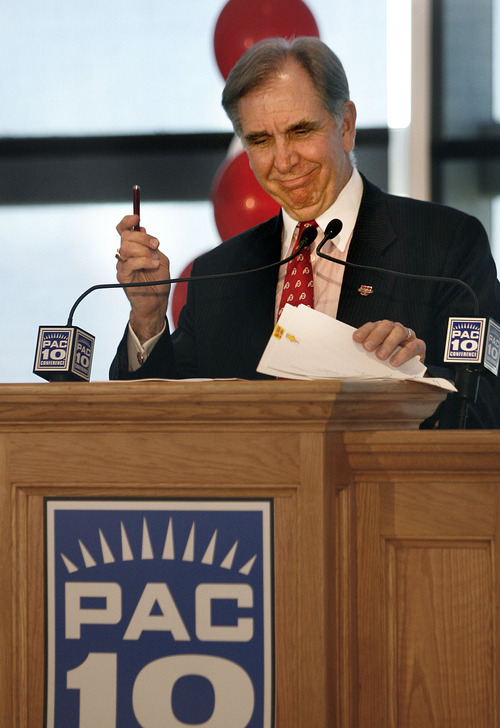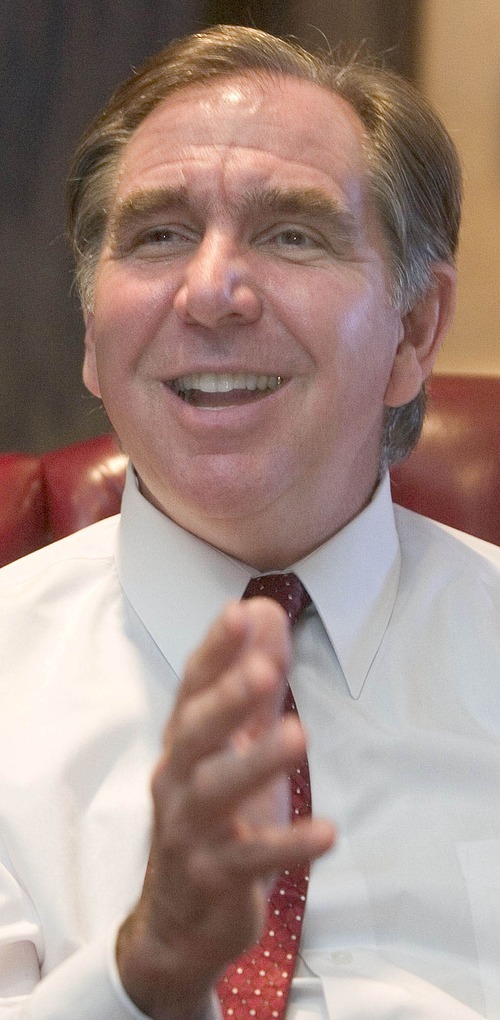This is an archived article that was published on sltrib.com in 2011, and information in the article may be outdated. It is provided only for personal research purposes and may not be reprinted.
After seven years at the helm of Utah's flagship research university, Michael Young is University of Washington's likely choice for its next president, according to sources familiar with the Washington search.
These sources have confirmed that UW officials were checking Young's Utah references as late as this weekend. Another source said Lorris Betz, the senior vice president for health sciences, will likely be tapped to serve as an interim president while a year-long national search is conducted to hire a permanent successor. Betz was set to retire next month after a decade running the U.'s medical empire and a national search is under way to find his successor.
UW's Board of Regents plans to meet Monday morning and announce its choice after coming out of closed session. Washington's presidential search has been shrouded in secrecy for a year, and Young's name has been the only one leaked to the media among a list of candidates the university's search committee forwarded to the regents two months ago. Citing anonymous Washington sources, the Seattle Times reported Friday night that Young was the regents' top choice.
Contacted Saturday, Young withheld comment until after the Washington regents publicly announce their choice Monday. So did U. trustees chairman Randy Dryer, although he praised Young's accomplishments at the helm.
"The university's national and international reputation has grown during his seven years," he said.
Dryer could not confirm whether Betz, who served as interim president in 2004, will return to the president's office in an interim capacity.
"If Mike is named as president [at Washington], I would encourage the [Utah Board of] Regents to appoint an interim president as soon as possible, but I can't say who that should be," Dryer said.
Regents Chairman David Jordan could not be reached Saturday.
Under Young's leadership, the U. has achieved many notable milestones, even as its state appropriation has been slashed. It has raised $1 billion so far in an eight-year capital campaign; extramural research funding has steadily climbed; about 2 million square feet has been added to the campus, built mostly with non-state money; gained entrance to the NCAA's premier Pacific Conference; and emerged as a leader in technology commercialization.
Early in his tenure he began a concerted effort to internationalize the campus, drawing on his diplomatic experience to forge greater links to Asia. He also championed campus diversity and helped broker a still-uneasy peace with the Utah Legislature over the divisive issue of guns on campus, long championed by legislative conservatives and opposed by university administrators. Under Young's leadership, the university abandoned the no-guns stance of his predecessor Bernie Machen and crafted policies that allow those holding concealed-weapon permits to carry a firearm on campus — as long as it remains concealed.
"He helped diffuse that issue, while Bernie Machen used it as a cause celebre," said Anthony Morgan, a former regent and retired U. administrator. "It was a source of resentment for a lot of legislators. It became a nonissue."
Young's potential move to Seattle would be a logical next upward step. He would be filling the position held by Mark Emmert, who left Washington a year ago to lead the NCAA. According to a recent analysis by the Chronicle of Higher Education, Emmert had been the second most highly compensated president of a public university with a compensation package worth up to $905,000. At the U., Young earns a base pay of $348,000, but his package in 2009-10 was worth $724,000 when including deferred compensation, according to the Chronicle's analysis.
The U. has 30,000 students enrolled — 23,000 undergraduate and 7,000 graduate.
The University of Washington serves about 48,000 students with a $4 billion operating budget to run its main campus in Seattle and two satellites in Tacoma and Bothell, both established in 1990. It has the second largest research enterprise of any U.S. university, garnering $1 billion in grants, more than double the U.'s annual haul.
Provost Phyllis Wise, a professor of biology, physiology and obstetrics, has been the interim president for the past year.
Young succeeded Machen as U. president in 2004, after serving as the law school dean at George Washington University and two decades on the faculty of Columbia University's law school. He graduated from Brigham Young University with a degree in political science and received his law degree from Harvard.
He clerked for Supreme Court Justice William Rehnquist, then later served in the first Bush administration's State Department, helping craft international trade and environmental treaties.
The 61-year-old Young is recently divorced and his three children are grown. He is a member of The Church of Jesus Christ of Latter-day Saints and a California native who loves skiing, motorcycle riding and other outdoor pursuits.
Tribune reporter Lya Wodraska contributed to this report.





